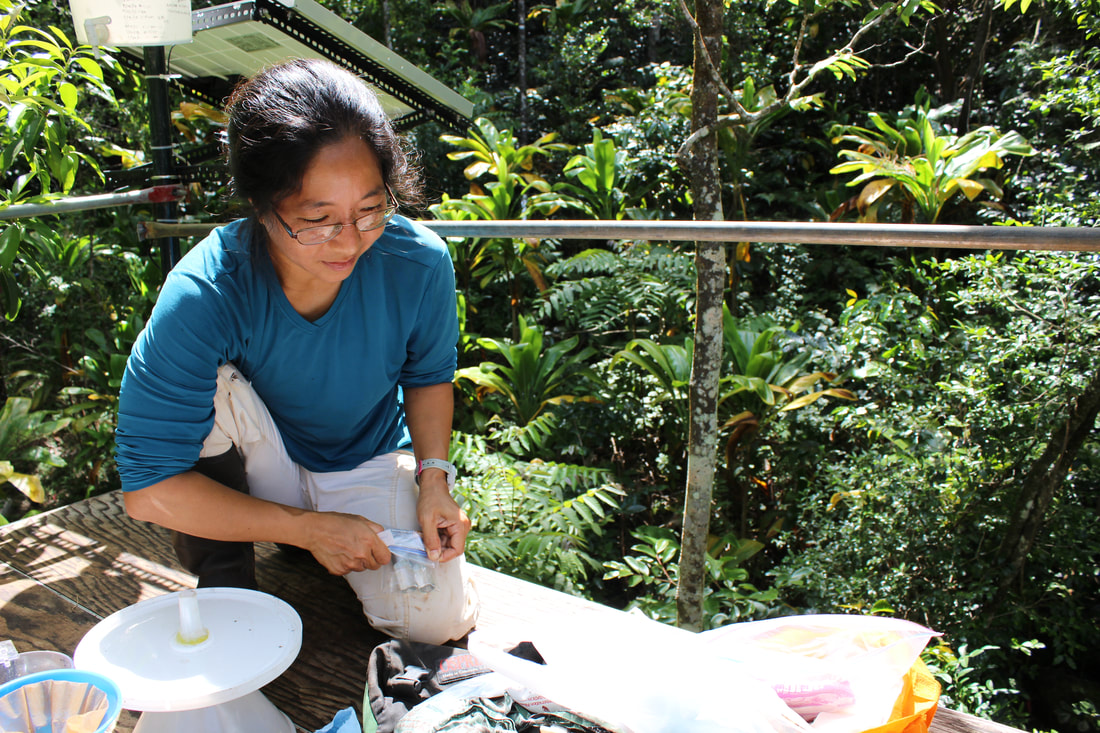My labmate and I joke about the term’s ambiguity since another ecohydrology lab on campus focuses on surface water flows and aquatic organisms; but our lab focuses on forests and fluxes. I fall on the ecology end of the ecohydrology spectrum and enjoy thinking about water fluxes and pools via their influence on plant community structure and succession.
What are your undergraduate and graduate degrees in?
I have an undergraduate degree in environmental engineering (MIT) and a master’s degree in botany (University of Hawaiʻi).
How did you arrive at working in/thinking about ecohydrology?
Looking back, I realize I’ve been exposed to ecohydrology since my undergrad days, but it has taken me time to understand the field through my own experiences. As an undergrad in the Parsons Lab (MIT), I had little context or appreciation for the high-level work being done in my own department. I spent my summers doing conservation biology fieldwork back home in Hawaiʻi. During my MS program, my advisor Kāʻeo Duarte had me read the mathematically oriented papers of Ignacio Rodriguez-Iturbe and colleagues, and I was co-advised by ecophysiologist Lawren Sack. I struggled with the different scales, methods, and perspectives of engineering and ecophysiology and found overlap of these realms in forestry research. I leaned heavily on this community and body of work during my master’s project using sapflow methods, which was driven by local land managers’ interest in the hydrologic value of different forest covers. While working with my energetic co-advisors was exciting, doing this within a community of classically-trained organismal, community, and evolutionary biology- focused botanists was sometimes disorienting, I appreciate the grounding I gained in plant science basics.
After my MS, I worked as a technician on a pre-contact Hawaiian dryland systems project led by Peter Vitousek. My job included running unirrigated sweet potato cropping experiments across a steep rainfall gradient to assess yield potential across the once expansive Leeward Kohala Field System (in C4 pasture grass for the last 100 years). With no available reference system to help us reconstruct field conditions, we drew inferences from patterns of current soil fertility, archaeological and ethnographic records, and insights from rural community members and project scientists. The experience was forensic and creative- gathering evidence and imagining what the system might have been like. It was also experimental- attempting to reconstruct and produce harvests to understand how farmers sustained staple crop production through seasonal and intra-annual drought and desiccating winds. Throughout my time in the field, I couldn’t stop thinking about how the heck you grow plants without much water—of course, doing this was technically my job. I was fascinated by our driest, hottest, most challenging site. I started to think about water limitation at different scales of time and space, both the sheltering of our crops from the wind, and, outside of our fenced plots, the seasonal rotation and cutting of cattle herds during the ongoing multi-year drought. Insights and theory from ecohydrology seem particularly relevant and useful to the more applied issues of maintaining and/or restoring natural and agro-ecosystems in the face of natural cycles of drought and anthropogenic (hydro)climate change.
It took me a few years to return to graduate school to pursue the PhD, but during those years, I visited and read up about dry systems. While an interest in dryland socio-ecological systems drew me back to grad school, my dissertation work now focuses on the impacts and mechanisms of plant invasion in dry to mesic Hawaiian forests. Lessons from pulsed systems provide a useful lens as I analyze my sensor data for ecological responses and hydrological processes; and my previous work experiences help me think about which processes might be the most important across Hawaiʻi’s heterogenous landscapes.
What do you see as an important emerging area of ecohydrology?
My personal bias is that emerging areas of ecohydrology (or perhaps a major gap) may be driven by geography and enabled through continued innovations that bring down research costs. After attending the Asia-Oceania Geosciences Society meeting this past summer and the Tropical Ecohydrology Chapman meeting in Cuenca, Ecuador in 2016, I now feel that ecohydrology has strong relevance for the quickly developing “Global South.” Enhancing local research capacity in these regions seems especially important given rapid land use change and the tropical and subtropical hydroclimatic settings of many of these countries.
Do you have a favorite ecohydrology paper? Describe/explain.
Noy-Meir, I. 1973. Desert Ecosystems: Environment and Producers. Annual Review of Ecology and Systematics 4:25–51.
This classic review provided me a conceptual framework for reading the tremendous body of literature (ecology and ecohydrology) that sprung out of it.
What do you do for fun (apart from ecohydrology)?
When I am not grad-studenting (getting a computer screen tan), I enjoy hiking and learning about different ecosystems/communities with my partner who is a microbial oceanographer and ecologist. I also spend time exploring archived information on Hawaiian sweet potato varieties, gardening, reading about social movements, visiting older relatives, and informally mentoring younger students on how to navigate the undergrad/grad labyrinth.

 RSS Feed
RSS Feed